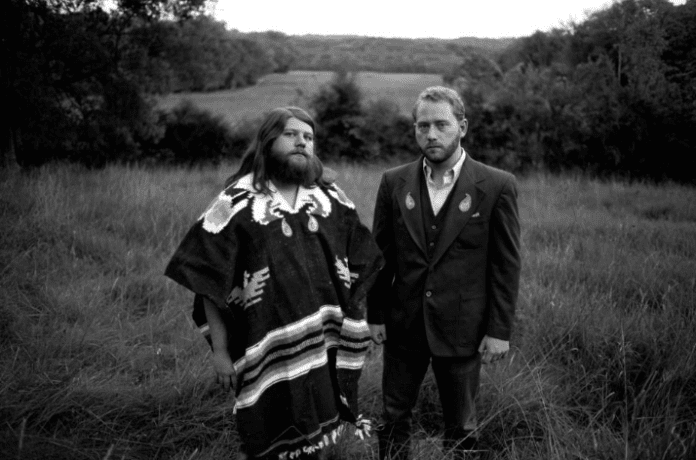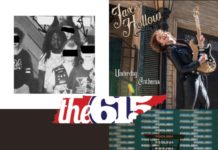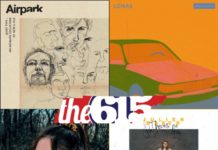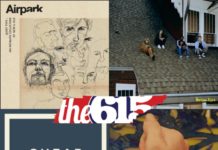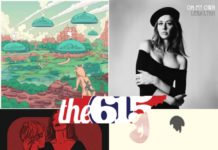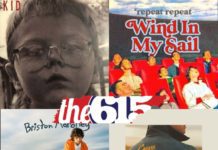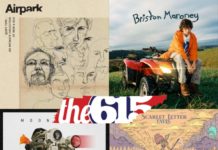After half a decade spinning wheels on the Great American Highway, through the brutal heartbreaks and dire sacrifices that come with chasing the mythical rock & roll dragon, Great Peacock’s Andrew Nelson and Blount Floyd have finally eased up on the throttle. Like rock & roll as it transitioned from the erratic abandon of the late ’60s to the country-tinged storytelling of the early ’70s—donning cowboy boots and dipping its bucket in the well of American folk music—they’ve put their electric guitars back in the case, rolled their stacks back from 11, and let a serene hush wash over them. Their sound now? Beautiful, unadorned, moving—the bountiful harvest of a deep friendship and an unbreakable musical bond.
“The hangover is definitely starting to wear off,” Nelson says. “The amps had gotten a little too loud.”
“With our old band, we’d been playing all this angsty downer rock,” Floyd explains. “So with Great Peacock, we wanted the songs to be simple, poppy—infectious.”
For the first time, Nelson and Floyd weren’t writing songs for themselves, but rather songs they hoped would connect with fans. With Great Peacock they would embrace an unselfish, unpretentious aesthetic. “I don’t want to alienate people any more,” Nelson says, laughing a bit as he recalls the darker, more confessional songs he used to write. “I’m at a point where I want as many people to like our music as possible.”
Floyd and Nelson met in their early 20s in Nashville, the former having come to MusicCity to break into recording and the latter to play rock & roll. When they first ran into each other, neither had any close friends in town yet, and their connection was instant. “From the moment we said ‘hello,’ we realized we were gonna be best friends,” Nelson says. “It’s the only time it’s ever happened in my life. Blount’s brother introduced us, and I was like, ‘This guy is cool!’”
About an hour later, they were shotgunning beers together. “And it’s not like there was a party going on, either,” Nelson explains. “We were talking about music and I said, ‘Let’s get some beer.’ So we went to the gas station and bought a 12 pack of Busch. At every moment in the night, we became better friends—I was like, ‘Dude, we should get the camouflage cans,’ and Blount was like, ‘Hell yes, let’s do it!’”
“And there was this guy in front of us buying a single gas-station rose,” Floyd recalls, “and he says, ‘Yo, can I get some cigarillos and a box of magnums?’”
“We were both like, ‘That’s real love, man. Real love,’” Nelson says. “‘This guy has his life figured out—we need to figure out ours!’ I don’t think we drank a single beer normal that night—we shotgunned the whole 12-pack.”
The new friends soon found that their musical chemistry was just as intense, and that their strengths and weaknesses were the perfect complement. “The big thing about us,” Nelson says, “is that I can’t sing harmony—I’m terrible at it. And Blount doesn’t have a strong lead voice. When we’re riding around listening to music, he never sings the melody; he naturally sings the harmony. So we’re a perfect fit—I need him to sound good, and he needs me.”
Since the pair started playing together, they’ve seen two bands—and about a dozen bandmates—come and go. Through it all, their musical partnership has been a constant. “We always seemed to get what each other was doing more than anyone else,” Nelson says. “He keeps me artistic, and I keep him grounded.”
As far as Great Peacock has already come—recording a stunning debut EP of harmony-driven acoustic pop, performing as part of stylish, socially conscious eyewear company Warby-Parker’s Class Trip, and landing a coveted spot at one of Paste magazine’s 2013 SXSW showcases—the group began, almost literally, as a lark. “We kept noticing this hilarious trend of bands with names like Fleet Foxes, Deer Tick, Vulture Whale—they all had two names,” Nelson says, “one of which was always an animal.”
Kidding around one night, Nelson and Floyd decided to start a new band called Great Peacock. “I thought it was gonna be this cockamamie joke,” Nelson says. “We’ve talked a million times about starting random bands—including a Southern-rock band called Swamp Ass—and didn’t follow through. But even for a while there, when we didn’t really have anything going, I never stopped writing songs because I have to write to maintain my sanity. It’s my version of therapy. And Blount hadn’t stopped, either. Writing gave us an excuse to hang out.
“But I still didn’t think we were actually gonna do it,” Nelson confesses about the new band. “Really, the only reason it happened is because we wrote ‘Desert Lark.’”
Without giving it much thought, Nelson and Floyd posted an acoustic demo of the song on Bandcamp. Friends, family and fans went crazy over it, begging them to follow through on the new project. “We didn’t expect that,” Nelson says. “I wasn’t planning on being in a band again. I really wasn’t.” The chiming, triumphant acoustic anthem would become the centerpiece of the Nashville duo’s new self-titled EP.
Great Peacock’s harmony-driven sound appeals to fans of indie-folk, but the group is different from contemporaries like Fleet Foxes and The Head and the Heart in that their music is inextricalbly linked with the South. It’s who they are—Floyd hailing from a family of Alabama peanut farmers, and Nelson a long line of Mississippi preachers and sharecroppers. “If I had my way in life,” Nelson admits, “I’d be a country singer. My dream is to be George Jones.”
“But those country singers don’t exist any more,” Floyd says.
So instead of trying to live in a long-gone past, Great Peacock draws from the same inspirations that once fueled their now-extinct forebears (geography, aging, love/hate family relationships, blood, death, birds), channeling them into an unmistakably modern sound. For Nelson and Floyd, it’s natural, inutitive. “We know that even though there’s a history we’re connected to, we’re of our time,” Nelson says. “We know most records aren’t made on tape any more, but we’re also very much aware that—no matter the year or the production style—the right melody can be timeless.”

